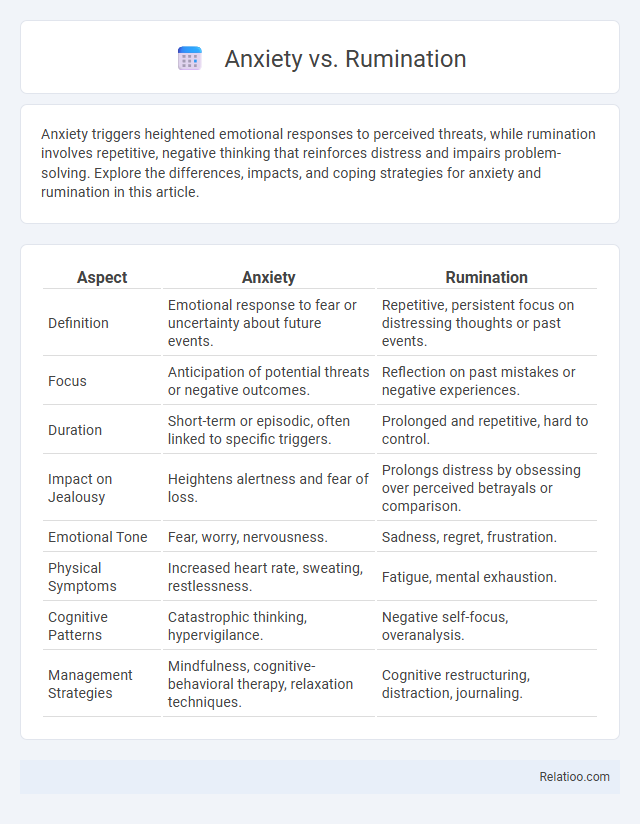Anxiety triggers heightened emotional responses to perceived threats, while rumination involves repetitive, negative thinking that reinforces distress and impairs problem-solving. Explore the differences, impacts, and coping strategies for anxiety and rumination in this article.
Table of Comparison
| Aspect | Anxiety | Rumination |
|---|---|---|
| Definition | Emotional response to fear or uncertainty about future events. | Repetitive, persistent focus on distressing thoughts or past events. |
| Focus | Anticipation of potential threats or negative outcomes. | Reflection on past mistakes or negative experiences. |
| Duration | Short-term or episodic, often linked to specific triggers. | Prolonged and repetitive, hard to control. |
| Impact on Jealousy | Heightens alertness and fear of loss. | Prolongs distress by obsessing over perceived betrayals or comparison. |
| Emotional Tone | Fear, worry, nervousness. | Sadness, regret, frustration. |
| Physical Symptoms | Increased heart rate, sweating, restlessness. | Fatigue, mental exhaustion. |
| Cognitive Patterns | Catastrophic thinking, hypervigilance. | Negative self-focus, overanalysis. |
| Management Strategies | Mindfulness, cognitive-behavioral therapy, relaxation techniques. | Cognitive restructuring, distraction, journaling. |
Understanding Anxiety: Definition and Symptoms
Anxiety is a mental health condition characterized by excessive worry, nervousness, and fear that interfere with daily activities. Symptoms include increased heart rate, restlessness, difficulty concentrating, and physical manifestations like sweating or trembling. Understanding the differences between anxiety and rumination helps your ability to manage mental health, as rumination involves repetitive, negative thinking that can exacerbate anxiety symptoms but is distinct from the broader clinical signs of anxiety disorders.
What Is Rumination? Key Features Explained
Rumination is the repetitive and passive focus on distressing thoughts, often involving past events or perceived mistakes, which distinguishes it from general anxiety that encompasses broader worry about future uncertainties. Key features of rumination include persistent overthinking, difficulty shifting attention away from negative content, and a tendency to amplify emotional distress. Unlike anxiety, rumination does not necessarily trigger physiological arousal but instead maintains a cycle of negative thought patterns that impede problem-solving and emotional recovery.
The Psychological Roots of Anxiety and Rumination
Anxiety stems from the brain's hyperactive threat detection system, often linked to the amygdala and prefrontal cortex dysfunction, triggering excessive worry and fight-or-flight responses. Rumination involves repetitive, intrusive thoughts primarily centered on past events, associated with dysregulation in the default mode network and impaired cognitive control. Both phenomena share psychological roots in maladaptive coping mechanisms, heightened sensitivity to stress, and disrupted emotional regulation pathways.
Similarities Between Anxiety and Rumination
Anxiety and rumination both involve repetitive negative thinking patterns that can significantly impact mental health and emotional stability. You may find that both conditions share symptoms such as persistent worry, difficulty concentrating, and heightened stress responses, which often create a cycle that reinforces distress. Understanding these similarities helps in developing targeted coping strategies to break the continuous loop of intrusive thoughts.
Key Differences: Anxiety vs Rumination
Anxiety involves intense feelings of fear, worry, and physiological arousal related to uncertain future events, triggering the body's "fight or flight" response. Rumination is a repetitive and passive focus on negative thoughts or problems, often dwelling on past experiences without seeking solutions. The key difference lies in anxiety's focus on future threats and emotional distress, whereas rumination centers on persistent dwelling over past issues, amplifying depressive symptoms rather than immediate fear responses.
How Anxiety Fuels Rumination
Anxiety triggers a cycle of persistent negative thoughts known as rumination, where Your mind repeatedly dwells on worries and perceived threats. This heightened state of anxiety intensifies rumination by amplifying fears, leading to increased emotional distress and impaired decision-making. Understanding the connection between anxiety and rumination is crucial for developing effective coping strategies to break this damaging loop.
The Impact of Rumination on Mental Health
Rumination, characterized by repetitive and passive focus on distressing thoughts, significantly worsens symptoms of anxiety and depression by prolonging negative emotional states. Your mental health suffers as rumination interferes with problem-solving abilities, increases stress levels, and promotes feelings of helplessness. Understanding the impact of rumination helps in developing effective coping strategies that reduce its detrimental effects on overall psychological well-being.
Breaking the Cycle: Managing Anxiety and Rumination
Breaking the cycle of anxiety and rumination requires targeted strategies that address both emotional triggers and repetitive thought patterns. You can manage anxiety by practicing mindfulness techniques, cognitive restructuring, and grounding exercises that disrupt rumination loops. Consistent use of these methods reduces the intensity and frequency of anxious rumination, promoting mental clarity and emotional resilience.
Effective Coping Strategies and Interventions
Effective coping strategies for anxiety and rumination include mindfulness meditation, cognitive-behavioral therapy (CBT), and grounding techniques that help you stay present and reduce repetitive negative thinking. Interventions such as structured journaling and CBT target intrusive thoughts characteristic of rumination, while relaxation exercises and exposure therapy address physiological symptoms linked to anxiety. Tailoring these evidence-based approaches enhances emotional regulation and fosters long-term mental well-being.
When to Seek Professional Help
Persistent anxiety that disrupts daily functioning or leads to intense physical symptoms warrants professional evaluation to prevent worsening mental health conditions. When rumination involves repetitive, intrusive thoughts causing emotional distress or impaired decision-making, consulting a mental health specialist can provide coping strategies and therapeutic interventions. Seek professional help if rumination becomes chronic, uncontrollable, or linked with depression, as early treatment improves outcomes and reduces the risk of developing more severe psychological disorders.

Infographic: Anxiety vs Rumination
 relatioo.com
relatioo.com